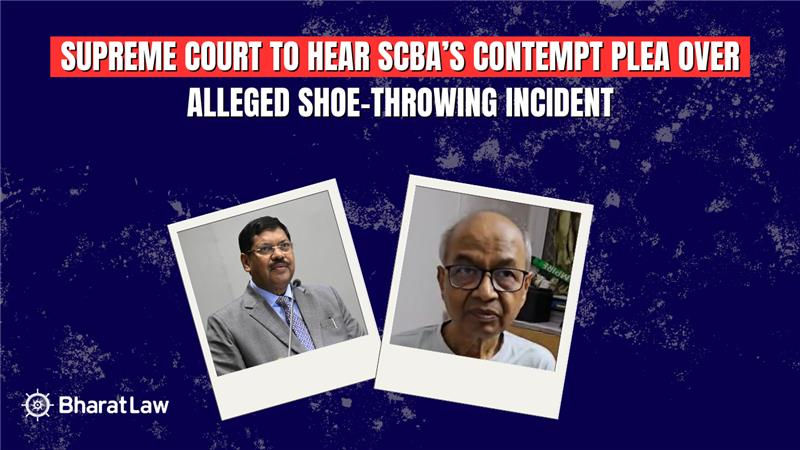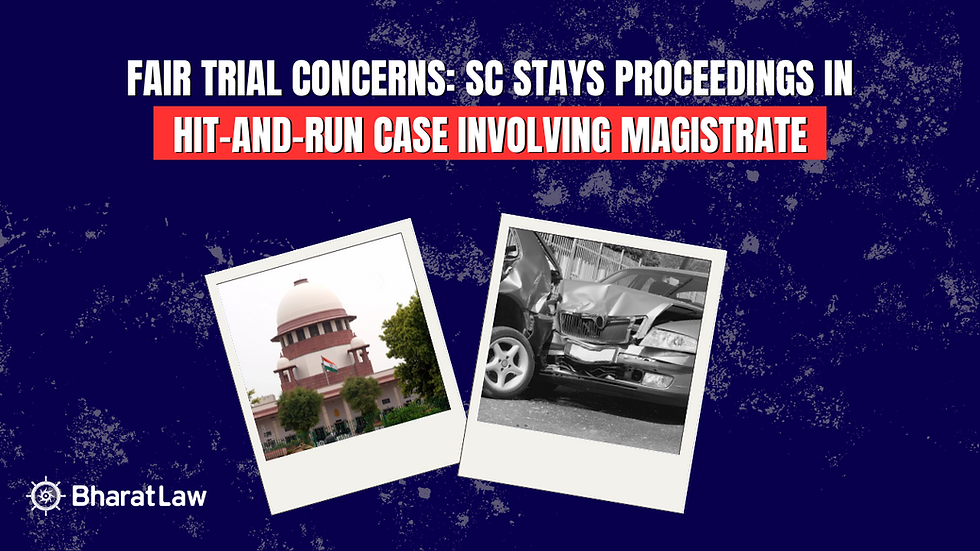Replication in Election Petitions: Supreme Court Clarifies - 'Replication is Always a Defensive Pleading in Nature
- Chintan Shah

- May 15, 2024
- 5 min read
Updated: Jul 9, 2024
Summary of the Judgment
Case Name: Sheikh Noorul Hassan vs Nahakpam Indrajit Singh & Ors.
Date: 8th May 2024
Judges: Honorable Chief Justice Dr. D.Y. Chandrachud, Honorable Justice J.B. Pardiwala, Honorable Justice Manoj Misra
Advocates: For Appellant: Mr. Shyam Divan For Respondent: Mr. Anupam Lal Das
Acts and Sections: Representation of the People Act, 1951 Section 100(1)(d)(i), (ii), and (iv) Section 100(1)(b) Section 81 Section 87 Section 86(5)
Cited Judgements: Anant Construction (P) Ltd. v. Ram Niwas K. Laxmanan v. Thekkayil Padmini and Ors. Bachhaj Nagar v. Nilima Mandal and Anr. Jeet Mohinder Singh v. Harminder Singh Jassi F.A. Sapa and others v. Singora and others Harkirat Singh v. Amrinder Singh
Introduction
In a landmark judgement dated 8th May 2024, the Supreme Court of India adjudicated a significant election dispute case between Sheikh Noorul Hassan and Nahakpam Indrajit Singh. The crux of the matter revolved around allegations of non-disclosure of material information in the nomination papers by the elected candidate, Sheikh Noorul Hassan. This case, emerging from the High Court of Manipur, presented critical questions on the procedural aspects of election petitions, particularly the permissibility and scope of subsequent pleadings like replications.
The judgement is noteworthy for its detailed analysis of the legal principles governing election petitions under the Representation of the People Act, 1951, and the Code of Civil Procedure (CPC). It underscores the importance of clear and comprehensive pleadings in ensuring fair trial processes in electoral disputes. By dissecting the interplay between the statutory provisions and procedural rules, the Supreme Court has provided clarity on the conditions under which subsequent pleadings can be allowed in election petition proceedings.
Detailed Analysis
The Supreme Court of India in its judgement dated 8th May 2024 addressed a civil appeal arising from an election petition. The case revolves around the challenge to the election of Sheikh Noorul Hassan by Nahakpam Indrajit Singh on grounds of non-disclosure of material facts in the nomination papers.
Factual Background
Nahakpam Indrajit Singh, the election petitioner, sought a declaration that the election of Sheikh Noorul Hassan was void under Sections 100(1)(d)(i), (ii), and (iv) and Section 100(1)(b) of the Representation of the People Act, 1951. The allegations centered on the appellant’s failure to disclose certain bank accounts, a vehicle, and liabilities in the nomination affidavit (Form 26).
The High Court of Manipur granted leave to the election petitioner to file a replication addressing new facts presented in the appellant's written statement. This replication was contested by the appellant, leading to the present appeal.
Analysis of High Court's Findings
The High Court, in its order, made several key observations:
The replication was deemed necessary to clarify the appellant's explanations regarding undisclosed bank accounts and liabilities.
The replication did not introduce new facts but elaborated on the issues raised in the election petition.
The court emphasized that allowing the replication was within the legal framework provided by the CPC and the Representation of the People Act, 1951.
The High Court's rationale was grounded in ensuring a fair trial and avoiding any prejudice to either party. The court relied on precedents and procedural rules to justify its decision, highlighting the importance of clarity and detailed pleadings in election disputes.
Judicial Reasoning and Legal Principles
The Supreme Court's analysis emphasized the interplay between the Representation of the People Act, 1951, and the CPC. The court reiterated that Section 87 of the Act mandates that election petitions be tried in accordance with the CPC, subject to the Act's provisions. Order VIII Rule 9 of the CPC permits subsequent pleadings, including replications, provided they do not introduce new causes of action or material facts.
The court referred to the distinction between 'material facts' and 'particulars,' emphasizing that the latter can be clarified or expanded upon in subsequent pleadings. The judgement cited Harkirat Singh v. Amrinder Singh, underscoring that material facts must be stated in the initial pleadings, and subsequent pleadings should only amplify these facts, not introduce new ones.
Submissions
For the Appellant:
Mr. Shyam Divan contended that the Representation of the People Act, 1951 does not provide for filing a replication and that allowing such would introduce time-barred allegations, thus violating Section 81(1).
For the Respondent:
Mr. Anupam Lal Das argued that Section 87 allows the application of Civil Procedure Code (CPC) procedures in election petitions, which includes filing a replication under Order VIII Rule 9.
Issues for Consideration
The primary issue was whether subsequent pleadings, like a replication, could be filed in the context of an election petition under the Representation of the People Act, 1951, and if so, under what circumstances.
Legal Analysis
Permissibility of Subsequent Pleadings in Election Petitions: Section 87 of the Representation of the People Act, 1951 mandates that an election petition shall be tried in accordance with the procedure applicable under the CPC, subject to provisions of the Act and rules thereunder. Order VI Rule 1 of CPC defines pleadings as a plaint and a written statement. Order VIII Rule 9 allows subsequent pleadings, such as a replication, with the court's leave.
Case Laws and Judicial Precedents: The judgement referred extensively to Anant Construction (P) Ltd. v. Ram Niwas and other cases to underline the distinction between 'material facts' and 'particulars.' The court emphasised that while 'material facts' form the foundation of a claim or defence, 'particulars' are details that support these material facts.
In Harkirat Singh v. Amrinder Singh, the Supreme Court highlighted the importance of including all material facts in the initial pleadings. Any attempt to introduce new material facts through replication or amendment beyond the statutory period could not be entertained.
Application to the Present Case: The High Court observed that the replication filed by the respondent was not introducing new material facts but was clarifying and amplifying the averments made in the election petition in response to the appellant's written statement. The court held that this clarification was necessary to ensure a fair trial and did not violate the statutory requirements.
The Supreme Court, in its analysis, concurred with the High Court's decision, noting that the replication sought to address new factual assertions made by the appellant in the written statement. The replication did not introduce a new cause of action but aimed to rebut the explanations provided by the appellant.
Conclusion
The Supreme Court upheld the High Court's decision to grant leave for filing the replication. The court emphasized that while granting leave for replication should not be done mechanically, it is permissible when it aims to clarify or rebut new facts presented in the written statement to ensure a fair trial.
The appeal was dismissed, and the court affirmed that no prejudice was caused to the appellant by allowing the replication. The judgement reinforces the principle that subsequent pleadings are permissible under the CPC, as applicable to election petitions, provided they do not introduce new material facts or causes of action beyond the statutory limitations.



Comments